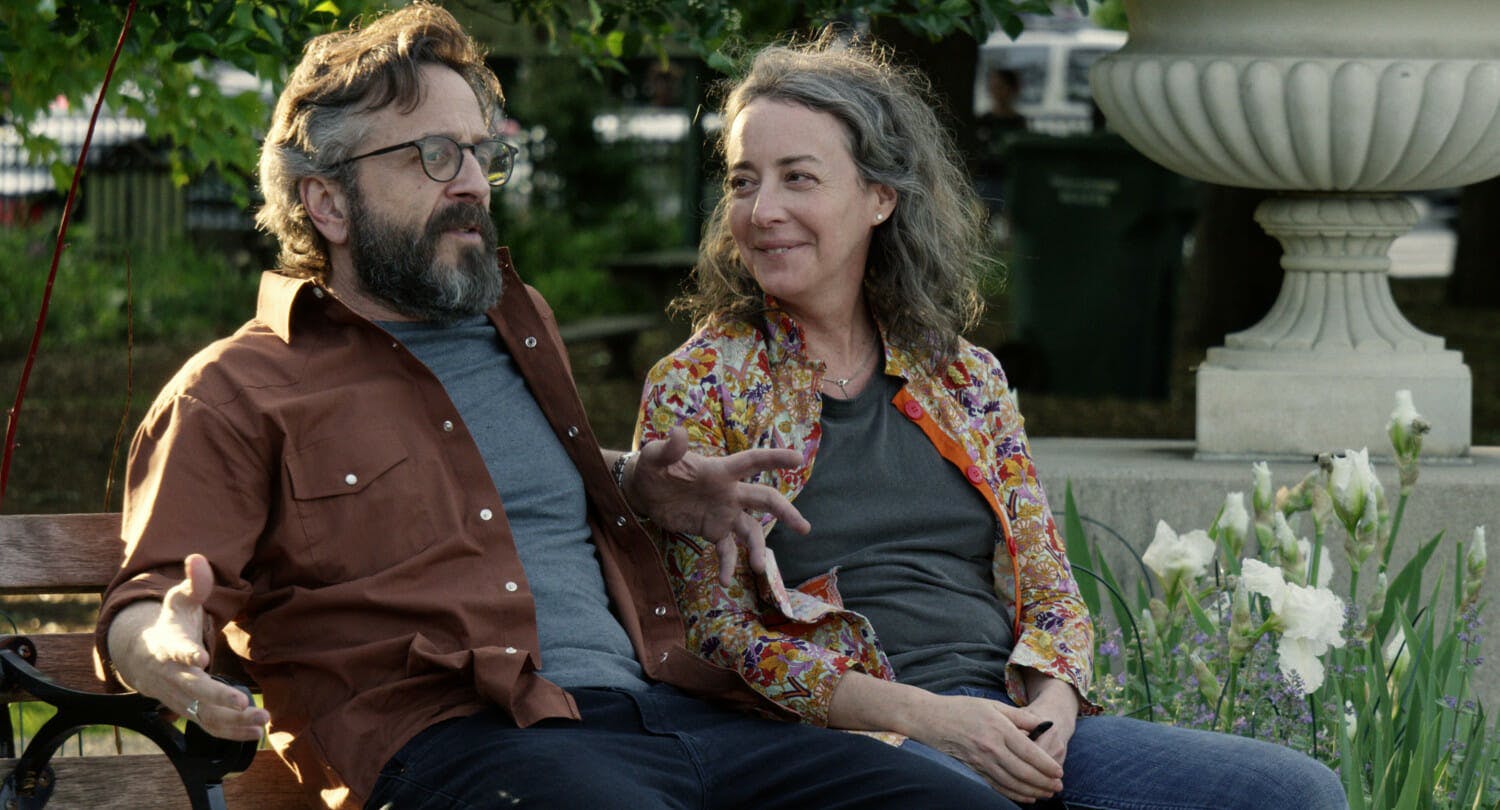The irony of Easy, director Joe Swanberg’s anthology show about love and sex in the Windy City, is that it demonstrates how love and sex are anything but what the title implies.
Season 2’s eight episodes feature stories about a couple whose relationship is tested when a package thief invades their neighborhood; a husband and wife taking the first steps toward an open marriage; a sex worker whose side hustle draws striking parallels to a local comedian’s; two brothers whose business relationship is falling apart—just as their partners’ starts to flourish; a graphic novelist who reconnects with his ex-wife before the re-release of a book which was largely inspired by her; a teen girl who rebels in surprising ways when her parents find out she’s having sex; a lesbian couple who begin to fight over jealousy issues when one of them takes up burlesque; and a woman who forms a strong bond with the child she’s babysitting after being dumped by her boyfriend.
There are plenty of returning players from last season, including Jacqueline Toboni, Kiersey Clemons, Jane Adams, Marc Maron, Zazie Beetz, Dave Franco, Aya Cash, Evan Jonigkeit, Elizabeth Reaser, Michael Chernus, and Kate Micucci. However, Swanberg also expands his ensemble this year, bringing in new talent such as Aubrey Plaza, Judy Greer, Brooklyn Nine Nine’s Joe Lo Truglio, Casual’s Michaela Watkins, and Danielle Macdonald from the Sundance hit Patti Cake$. There are also a few faces which audiences may be seeing for the first time in the mix, including sex writer Karley Sciortino and Chicago comic Odinaka Ezeokoli.
Swanberg, who writes and directs every episode, drops a couple of the storylines from last season although some of the old characters pop up in cameos. This is part of what makes Easy a fun watch. You never know what new actor is going to come through and do an episode, or which of the many interconnected individuals in this ongoing story Swanberg is going to check in with. Easy is an anthology show: Characters may appear in multiple episodes in a season, but in the purest sense, these are short films. He’s focused on giving the audience a glimpse at a new slice of life each time.
There are no curveballs here, with the slight exception of the episode starring Sciortino and Ezeokoli, who play the respective leads in the story about escorting and comedy. Plaza is a nice addition, but her episode, “Package Thief,” falls flat. “Open Marriage,” which features Reaser and Chernus’ husband-and-wife duo, is heartbreaking, but also joyous and exciting.
“Spent Grain,” about beer brothers Franco and Jonigkeit and their significant others played by Beetz and Cash, brings these characters back to earth. Last year found them embarking on a new adventure, while this year finds them weighed down by fatherhood and the realities of owning a business. Swanberg must like this storyline, as it’s the third time he’s explored it, and they were the only characters to get more than one episode in season 1.
Another highlight among the returning cast is Micucci, whom we first met trying to have a threesome with a married couple in season 1. Her character, Annie, remains unlucky in love this season, but her episode, “Baby Steps,” is more about her desire to become a mom and get to the part of the relationship that happens after you’ve been with someone for awhile. It goes against the show’s nature to say that “Baby Steps,” which is the season finale, ends on a cliffhanger, though it does leave open some interesting possibilities should the series get another season.

My favorite story continues to be Marc Maron’s. Playing middle-aged graphic novelist Jacob Malco, Maron proves here as he did in GLOW that he’s a surprisingly good actor—at least when he’s playing a character who’s not too far from himself. Though his episodes feature some heavy-handed messages about social media in keeping with Maron’s cranky, dissatisfied persona. He found a surprisingly compelling scene partner last year in Emily Ratajkowski, and he also has great chemistry with Michaela Watkins in season 2’s “Conjugality.”
The series explores specific subcultures within the city of Chicago with lived-in authority. Whether it’s the comedy community, burlesque scene, or craft beer world (something Swanberg must be taken with, as he previously explored it in 2013’s Drinking Buddies), Easy proves a thoughtful and multi-faceted love letter to Chicago. I used to call the city home too, and found myself getting nostalgic.
A pioneer in the so-called “mumblecore” genre, low-rent films ripe with loose and oft-improvised dialogue, Swanberg is an artist whose work is hit or miss. Drinking Buddies and Win It All showcased his range from low to high-concept comedy. Other films like Hannah Takes the Stairs, Silver Bullets, and Happy Christmas were bogged down with too much experimentation and sloppy execution.
Easy is Swanberg’s best work. There are times this show is too improvisational and falls flat. But as a serialized TV series, Easy is an insightful and realistic look at dating and relationships that suits his filmmaking tendencies. This is a show that simply couldn’t have existed 10 years ago without a platform like Netflix where it can breathe and go at its own meditative pace. Season 2 is a lot of people trying to figure out how they feel about each other, people making mistakes, people making up; the stuff real relationships are made of, basically. If you are OK with a show that doesn’t follow a typical structure, Easy is a lovely watch.
Still not sure what to watch on Netflix? Here are our guides for the absolute best movies on Netflix, must-see Netflix original series and movies, and the comedy specials guaranteed to make you laugh.


